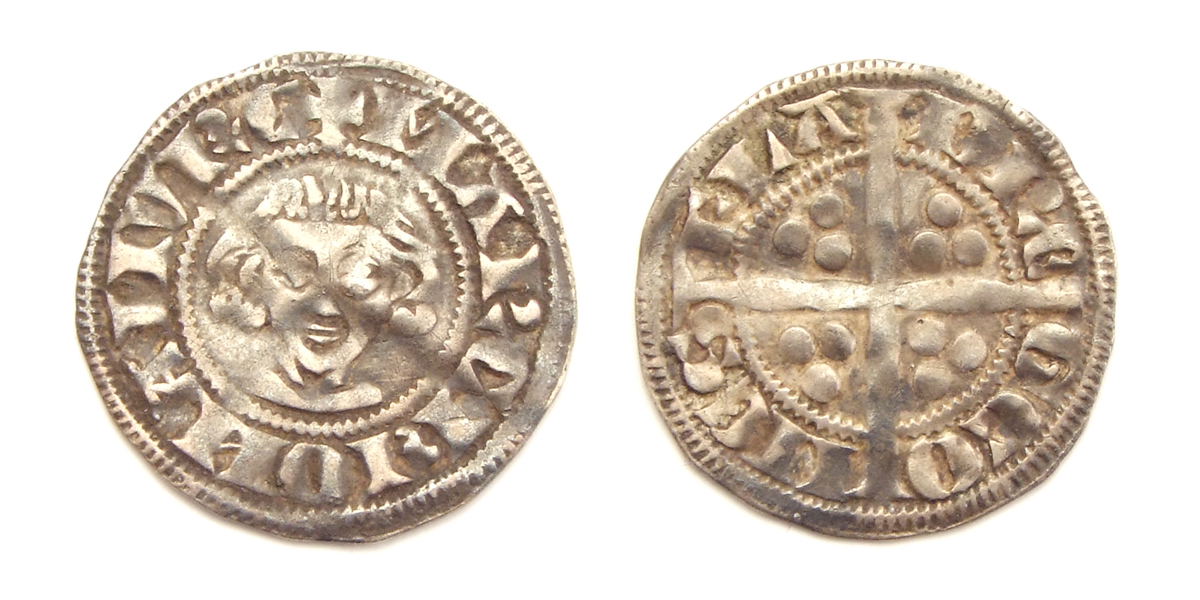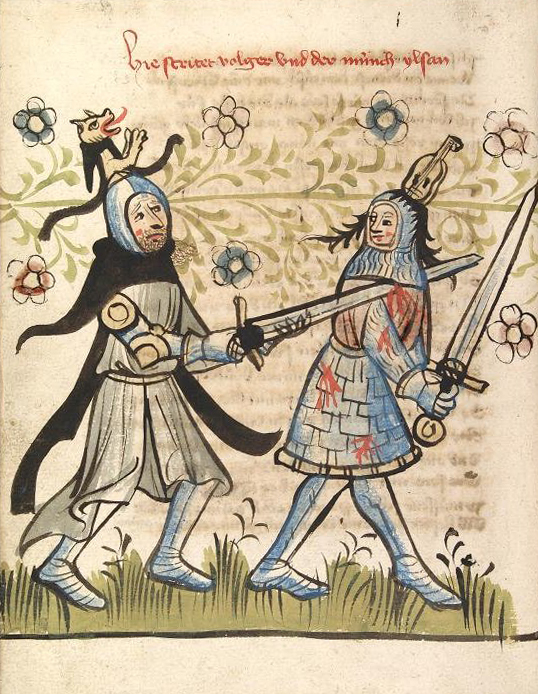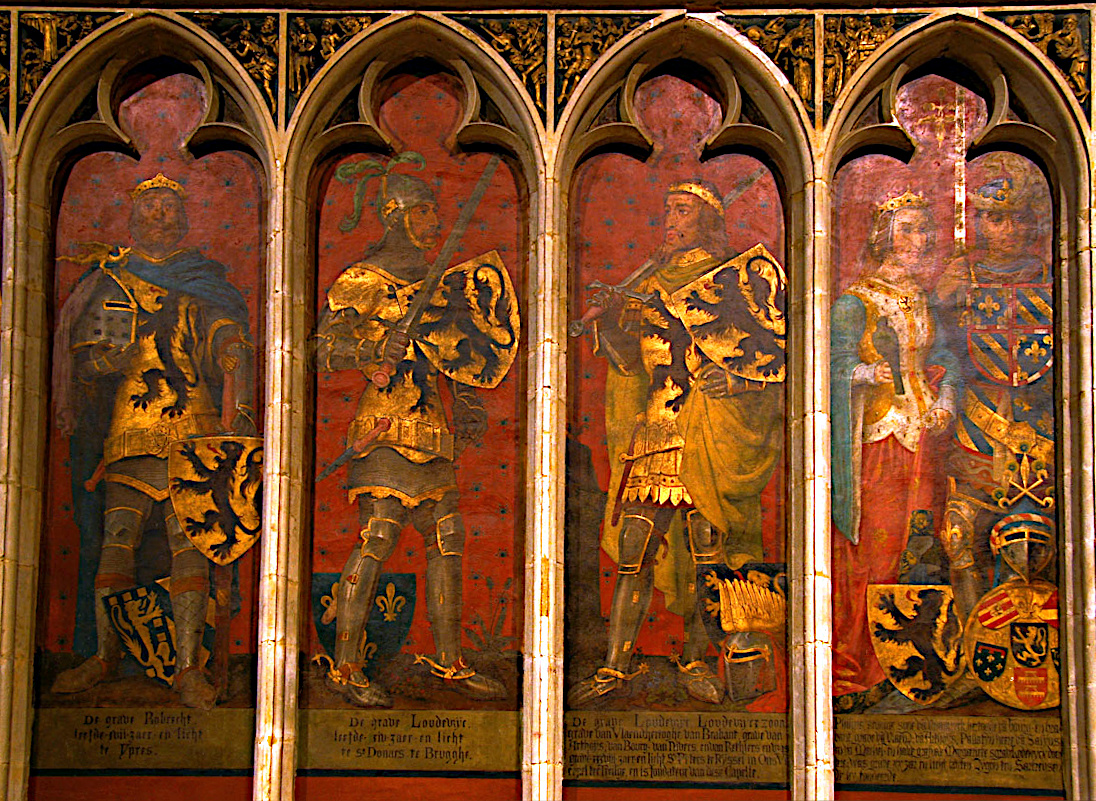|
Guy, Count Of Flanders
Guy of Dampierre (french: Gui de Dampierre; nl, Gwijde van Dampierre) ( – 7 March 1305, Compiègne) was the Count of Flanders (1251–1305) and Marquis of Namur (1264–1305). He was a prisoner of the French when his Flemings defeated the latter at the Battle of the Golden Spurs in 1302. Biography Guy was the second son of William II of Dampierre and Margaret II of Flanders. The death of his elder brother William in a tournament made him joint Count of Flanders with his mother. (She had made William co-ruler of Flanders in 1246 to ensure that it would go to the Dampierre children of her second marriage, rather than the Avesnes children of her first.) Guy and his mother struggled against the Avesnes (led by John I, Count of Hainaut) in the War of the Succession of Flanders and Hainault, but were defeated in 1253 at the Battle of Walcheren, and Guy was taken prisoner. By the mediation of Louis IX of France, he was ransomed in 1256. Some respite was obtained by the death ... [...More Info...] [...Related Items...] OR: [Wikipedia] [Google] [Baidu] |
Surcoat
A surcoat or surcote is an outer garment that was commonly worn in the Middle Ages by soldiers. It was worn over armor to show insignia and help identify what side the soldier was on. In the battlefield the surcoat was also helpful with keeping the sun off the soldier and their armor which helped prevent heat stroke and heat exhaustion. The name derives from French language, French meaning "over the coat", a long, loose, often sleeveless coat reaching down to the feet. History Men's surcoat From about the late 12th century, knights wore long, flowing surcoats. From the early to mid 13th century, these were frequently emblazoned with their personal Coat of arms, arms, over their armour. These usually extended to about mid-calf, had slits in the bottom front and back, allowing the wearer to ride comfortably, and were either sleeved or sleeveless. Historians believe that the practice of wearing white surcoats was adopted during the Crusades, their main purpose being to reflect the ... [...More Info...] [...Related Items...] OR: [Wikipedia] [Google] [Baidu] |
Philip IV Of France
Philip IV (April–June 1268 – 29 November 1314), called Philip the Fair (french: Philippe le Bel), was King of France from 1285 to 1314. By virtue of his marriage with Joan I of Navarre, he was also King of Navarre as Philip I from 1284 to 1305, as well as Count of Champagne. Although Philip was known to be handsome, hence the epithet ''le Bel'', his rigid, autocratic, imposing, and inflexible personality gained him (from friend and foe alike) other nicknames, such as the Iron King (french: le Roi de fer, link=no). His fierce opponent Bernard Saisset, bishop of Pamiers, said of him: "He is neither man nor beast. He is a statue." Philip, seeking to reduce the wealth and power of the nobility and clergy, relied instead on skillful civil servants, such as Guillaume de Nogaret and Enguerrand de Marigny, to govern the kingdom. The king, who sought an uncontested monarchy, compelled his upstart vassals by wars and restricted their feudal privileges, paving the way fo ... [...More Info...] [...Related Items...] OR: [Wikipedia] [Google] [Baidu] |
William Of Jülich
William of Jülich, called the Younger (Dutch: ''Willem van Gulik de Jongere''; died August 18, 1304), was one of the Flemish noblemen that opposed the annexation policies of the French king Philip IV, together with Pieter de Coninck. He was also archdeacon of the prince-bishopric of Liège. William was the son of William the Elder and grandson of William IV, Count of Jülich, and of Maria, a daughter of Guy of Dampierre, Count of Flanders and Matilda of Bethune. His connection to the Flemish count and his wish to avenge the imprisoning of his uncles Robert III of Bethune and by the French king presumably explains his support for the Flemish resistance. An extra incentive for this support could have been the murder of his uncle Walram, Count of Jülich by the French after the Battle of Bulskamp in 1297. The Flemish resistance led to the unexpected victory over the French during the Battle of the Golden Spurs in 1302. William of Jülich gained another victory against the Frenc ... [...More Info...] [...Related Items...] OR: [Wikipedia] [Google] [Baidu] |
William IV, Count Of Jülich
William IV, Count of Jülich (c. 1210 – 16 March 1278) was the son and heir of William III of Jülich and Mathilde of Limburg, daughter of Waleran III, Duke of Limburg.Walther Möller, ''Stammtafeln westdeutscher Adelsgeschlechter im Mittelalter'' (Darmstadt, 1922, reprint Verlag Degener & Co., 1995), Vol. 1, page 14. William's father joined the Crusades in 1217 and died in the Siege of Damietta in 1218. William succeeded his father as Count of Jülich under the guardianship of his uncle, Eberhard of Hengenbach. In the 1220s and early 1230s William greatly expanded his territory. In 1234 he fought in the battle of Altenesch in the Stedinger Crusade and was made imperial administrator of Konzen and Aachen, guardian of Kornelimünster and over the possessions of Essen Abbey on the left bank of the Rhine river. He also won the imperial fiefdoms of Sinzig, Hengenbach-Heimbach, Merzenich, Thürnich, Düren and Bardenberg, thus doubling the possessions of the Counts of Jü ... [...More Info...] [...Related Items...] OR: [Wikipedia] [Google] [Baidu] |
Robert VII, Lord Of Bethune
The name Robert is an ancient Germanic given name, from Proto-Germanic "fame" and "bright" (''Hrōþiberhtaz''). Compare Old Dutch ''Robrecht'' and Old High German ''Hrodebert'' (a compound of '' Hruod'' ( non, Hróðr) "fame, glory, honour, praise, renown" and ''berht'' "bright, light, shining"). It is the second most frequently used given name of ancient Germanic origin. It is also in use as a surname. Another commonly used form of the name is Rupert. After becoming widely used in Continental Europe it entered England in its Old French form ''Robert'', where an Old English cognate form (''Hrēodbēorht'', ''Hrodberht'', ''Hrēodbēorð'', ''Hrœdbœrð'', ''Hrœdberð'', ''Hrōðberχtŕ'') had existed before the Norman Conquest. The feminine version is Roberta. The Italian, Portuguese, and Spanish form is Roberto. Robert is also a common name in many Germanic languages, including English, German, Dutch, Norwegian, Swedish, Scots, Danish, and Icelandic. It can be u ... [...More Info...] [...Related Items...] OR: [Wikipedia] [Google] [Baidu] |
Battle Of Mons-en-Pévèle
The Battle of Mons-en-Pévèle (or Pevelenberg) was fought on 18 August 1304 between the French and the Flemish. The French were led by their king, Philip IV. Prelude The French king wanted revenge for the defeat in Battle of the Golden Spurs in 1302, after which the Flemish had retaken Douai and Lille. By the beginning of 1304, the French king was ready to attack the Flemish rebels. While the French army, led by the king himself and Foulques du Merle, marched north to attack William of Julich's force, the French navy sailed to Zeeland to unite with the army of Hainault and Holland. It was this combined northern force in Zeeland which struck the first blow on 10–11 August when it soundly defeated Guy of Namur's army and navy at the Battle of Zierikzee; Guy was captured and the Flemish conquest of Holland was halted. Philip of Chieti, son of Guy, Count of Flanders, had gathered a strong Flemish army to stop the French invasion and taken up positions on the Pévèle hill. ... [...More Info...] [...Related Items...] OR: [Wikipedia] [Google] [Baidu] |
Battle Of Zierikzee
The battle of Zierikzee was a naval battle between a Flemish fleet and an allied Franco- Hollandic fleet which took place on 10 and 11 August 1304. The battle, fought near the town of Zierikzee, ended in a Franco-Dutch victory. The battle is part of a larger conflict between the Count of Flanders and his French feudal lord, King Philip IV of France (1296–1305). Flemish invasion of Hainaut, Zeeland and France The County of Zeeland was an area that had been contested between the Count of Flanders and the Count of Holland since the 11th century. Originally granted in 1012 by Emperor Henry II to the count of Flanders Baldwin IV, by 1076 the area had become part of Holland but under Flemish overlordship. After the Flemish victory in the battle of the Golden Spurs, the Flemish attacked John II Avesnes, count of Holland, Zeeland and of Hainaut and conquered Lessines. The House of Dampierre and the House of Avesnes had been involved in a familial war for decades. In retaliation to ... [...More Info...] [...Related Items...] OR: [Wikipedia] [Google] [Baidu] |
Siege Of Tournai (1303)
The siege of Tournai was an event of the Franco-Flemish War in 1303. Following French defeat at the Battle of the Golden Spurs, the Flemish army entered France, burning the town of Thérouanne and laying siege to Tournai. A French army of 1,400 men led by Foulques du Merle and reinforced by soldiers of John II, Count of Holland, arrived to bolster the city's defences in June 1303. The Flemish campaign lasted forty-seven days.J. F. Verbruggen, ''The Battle of the Golden Spurs (Courtrai, 11 July 1302): A Contribution to the History of Flanders' War of Liberation, 1297-1305'' (Boydell & Brewer, 2002). The siege was ended by negotiations between Philip IV of France and the Flemish, in which the French agreed to release their prisoner, Guy, Count of Flanders Guy of Dampierre (french: Gui de Dampierre; nl, Gwijde van Dampierre) ( – 7 March 1305, Compiègne) was the Count of Flanders (1251–1305) and Marquis of Namur (1264–1305). He was a prisoner of the French when his F ... [...More Info...] [...Related Items...] OR: [Wikipedia] [Google] [Baidu] |
Robert III Of Flanders
Robert III (1249 – 17 September 1322), also called Robert of Béthune and nicknamed The Lion of Flanders (''De Leeuw van Vlaanderen''), was the Count of Nevers from 1273 and Count of Flanders from 1305 until his death. History Robert was the oldest son of Guy of Dampierre from his first marriage with Matilda of Béthune. His father essentially transferred the reign of Flanders to him in November 1299, during his war with Philip IV of France. Both father and son were taken into captivity in May 1300, and Robert was not released until 1305. Robert of Béthune gained military fame in Italy, when he fought at the side of his father-in-law, Charles I of Sicily (1265–1268) against the last Hohenstaufens, Manfred and Conradin. Together with his father he took part in 1270 in the Eighth Crusade, led by Saint Louis. After his return from the Crusade he continued to be a loyal aid for his father, politically and militarily, in the fight against the attempts of the French King Ph ... [...More Info...] [...Related Items...] OR: [Wikipedia] [Google] [Baidu] |
English Expedition To Flanders (1297–98)
English usually refers to: * English language * English people English may also refer to: Peoples, culture, and language * ''English'', an adjective for something of, from, or related to England ** English national identity, an identity and common culture ** English language in England, a variant of the English language spoken in England * English languages (other) * English studies, the study of English language and literature * ''English'', an Amish term for non-Amish, regardless of ethnicity Individuals * English (surname), a list of notable people with the surname ''English'' * People with the given name ** English McConnell (1882–1928), Irish footballer ** English Fisher (1928–2011), American boxing coach ** English Gardner (b. 1992), American track and field sprinter Places United States * English, Indiana, a town * English, Kentucky, an unincorporated community * English, Brazoria County, Texas, an unincorporated community ... [...More Info...] [...Related Items...] OR: [Wikipedia] [Google] [Baidu] |
Battle Of Furnes
The Battle of Furnes, also known as ''Battle of Veurne'' and ''Battle of Bulskamp'', was fought on 20 August 1297 between French and Flemish forces. The French were led by Robert II of Artois and the Flemish by Guy of Dampierre. The French forces were victorious. However, Robert's son Philip Philip, also Phillip, is a male given name, derived from the Greek (''Philippos'', lit. "horse-loving" or "fond of horses"), from a compound of (''philos'', "dear", "loved", "loving") and (''hippos'', "horse"). Prominent Philips who popularize ... was gravely wounded during the battle and died a year later of his wounds.Charles T. Wood, ''The French Apanages and the Capetian Monarchy, 1224-1328'', (Harvard University Press, 1966), 59. The Flemish were supported by Walram, Count of Jülich, who was killed during the battle. Notes Battles involving France 1297 in Europe 1290s in France Battles of the Middle Ages Conflicts in 1297 Battles involving Flanders Franco-Flemis ... [...More Info...] [...Related Items...] OR: [Wikipedia] [Google] [Baidu] |
Robert II Of Artois
Robert II (September 1250 – 11 July 1302) was the Count of Artois, the posthumous son and heir of Robert I and Matilda of Brabant. He was a nephew of Louis IX of France. He died at the Battle of the Golden Spurs. Life An experienced soldier, he took part in the Aragonese Crusade and attempted an invasion of Sicily in 1287. In 1288, Robert began work on a great park at Hesdin. The park contained a menagerie, aviaries, fishponds, orchards, an enclosed garden and facilities for tournaments. It also contained mechanical statues including waving monkeys draped in skins. He defeated the Flemings in 1297 at the Battle of Furnes. He was again sent into Flanders in July 1302, where he began to ravage the countryside and attempted to take the town of Kortrijk (Courtrai). Battle of the Golden Spurs He then met the Flemish army at the Battle of the Golden Spurs. His infantry advanced with great success against the Flemings (mostly city militia), but he ordered their recall to allow his ... [...More Info...] [...Related Items...] OR: [Wikipedia] [Google] [Baidu] |



.jpg)
